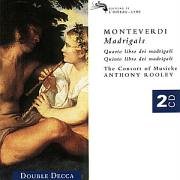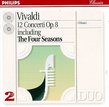| All Artists: Claudio Monteverdi, Emma Kirkby, Evelyn Tubb, The Consort of Musicke, Anthony Rooley, Mary Nichols, Joseph Cornwell, Paul Elliott, Andrew King, David Thomas Title: Monteverdi: Madrigals / Rooley, The Consort of Musicke Members Wishing: 0 Total Copies: 0 Label: Oiseau Lyre Release Date: 10/14/1997 Genres: Pop, Classical Styles: Vocal Pop, Opera & Classical Vocal, Historical Periods, Baroque (c.1600-1750) Number of Discs: 2 SwapaCD Credits: 2 UPC: 028945571829 |
Search - Claudio Monteverdi, Emma Kirkby, Evelyn Tubb :: Monteverdi: Madrigals / Rooley, The Consort of Musicke
 | Claudio Monteverdi, Emma Kirkby, Evelyn Tubb Monteverdi: Madrigals / Rooley, The Consort of Musicke Genres: Pop, Classical
|
Larger Image |
CD DetailsSimilarly Requested CDs
|
CD ReviewsHear the Renaissance dissipate before your ears... Justin Weaver | 03/26/2001 (5 out of 5 stars) "... dissipate and morph into something quite extraordinary: the early Baroque in the hands of its first great master, Monteverdi!Never has a composer been so generous in gradually but persistently 'easing' his audience into a new art, a new music. True the fourth book of madrigals has Sfogava con le stelle (marvelously rendered with the rest of the book here by the Consort of Musicke), but the fifth - therein lies the rub. It all begins with the familiar (but dissonant and daring!) sonorities of the Second Practice, but by the end these teeming harmonies have been reduced to chordal instrumental accompaniments to the most gorgeous monody and, yes, Baroque choral singing... you can quite literally hear the Renassiance tradition slowly dissolve into the Baroque, one of the most engaging 'moments musical'. It takes a mind of rare genius to father a new age of music... Monteverdi did just that and in THESE very madrigals.As a bonus, Rooley et al. have included excerpts from the 7th and 8th books of madrigals just to show us where all these experiments led... Get to know these pieces. It's worth the efforts!" The 'step' toward a new style Bogdan Minut | Columbus, IN United States | 03/18/2003 (5 out of 5 stars) "This is a very fine presentation of some of the greatest madrigals ever written. Part of a whole series of recordings of the famous Books of Madrigals by Monteverdi, this double CD presents earlier recordings made by a group of distinguished singers led by Emma Kirkby together with Anthony Rooley's Consort of Musicke. One of the seminal groups of the Early Music movement, the Consort is known for its contributions to the performance of Renaissance music through the 1970s, 80s, and 90s.
I found this collection useful for the historical connotations of the program. One of the most important aspects is the birth of the new style in the first years of the seventeenth century. With the last six pieces of the Fifth Book, Monteverdi specifically demands the use of continuo instruments and through this he clearly marks the transition to the Baroque era. The seconda pratica (second practice) characterizes most of these two books of madrigals. The opening of the madrigal "Sfogava con le stelle" (Communing with the stars) represents an ensemble declamation on one chord in the rhythm of the text. In the new style, the words should govern the music, the sonorities must be in accordance with the textual images and ideas. The theatrical style is reinforced in the pieces of the Fifth Book by the particular dissonance treatment, such as unprepared sevenths and ninths. They were characterized at the time as improper. The importance of the text is also evident through the thinner textures that Monteverdi uses at different moments in a piece. The composer writes passages where only alternating pair voices sing or if there are three voices at a time, one of them has a functional role while the other two move in parallel thirds, as in "Io mi son giovinetta" (I am young). Polyphony is not abandoned (a few madrigals have reminiscences of the prima pratica), but enhanced to smaller groups of voices competing or completing with each other. The present recording sets apart through the clarity of the voices and the delicate ornamentation of certain passages, including a perceptible vibrato often used to enrich the sonority of such a small group. An impeccable vocal technique, which doesn't show off but serves the communication of emotions, an elegant treatments of the dynamics, including expressive accents, and an impeccable Italian diction are defining elements of this performance. Balance is sometimes a very difficult task in the context of Monteverdi's madrigals, but these singers are well coordinated and prove a highly trained sense of awareness. To give this recording an even more interesting angle, the collection is rounded off by other four substantial accompanied madrigals. "Con che soavità" and "Tempro la cetra" come from the 7th Book, while "Mentre vaga Angioletta" and "Ogni amante è guerrier" are taken from the 8th Book. These pieces give the listeners an idea about the direction of Monteverdi's music." |

 Track Listings (23) - Disc #1
Track Listings (23) - Disc #1








